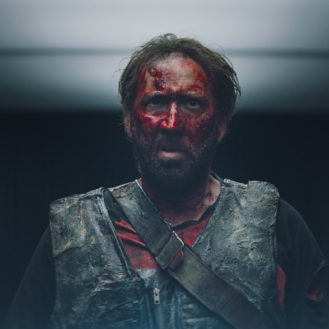By: Addison Wylie
For a Good Time, Call… uses colourful language whenever it can. It needs to. When a film has two lead characters opening up their own phone sex hotline, naughty language is a prerequisite – and the film has certainly earned its R rating.
However, the film also needs the salty language to cover up just how lifeless the film is. If actresses Lauren Miller and Ari Graynor talk excessively about penises and oral sex, maybe audiences won’t notice how bored they are.
In their defense though, Miller and Graynor have great chemistry with one another, which helps the film stay somewhat afloat during their one-on-one scenes.
Miller, who plays Lauren Powell, and Graynor, who plays Katie, are forced to live with each other due to unfortunate circumstances. Laurens boyfriend up and left for Italy leaving her to fend for herself. Katie’s grandmother whom she had been living with, has passed away and now Katie must try to come up with the rent by herself.
In order to keep a roof over their head, the two opposites move in to Katie’s suite under the stern advisory of their gay friend Jesse, played by Justin Long; who is trying anything he can to add finesse to the production’s flatness.
Lauren quickly figures out that Katie has more than one job; one of these being a phone sex operator. Being tight for cash, Lauren thinks up a business model for the unlikely duo to create their own phone sex company.
On paper and on screen, the set-up for this film feels like a wild concoction of sitcom devices and cliches. Currently on TV, the comedies 2 Broke Girls, Don’t Trust the B—- in APT. 23, and HBO’s Girls are using these plot devices or character molds and are actually pulling these off more competently and in less time. That’s because these shows are making the conventional elements not so conventional.
For A Good Time, Call… could’ve jumped this hurdle if it raised itself above the routine cliches and put an uncommon twist on the friends-slash-business partners story.
Sadly, the film thinks that by having crude and rude language throughout, it makes these stock characters “different”. When in fact, you should make the characters take original routes with their arcs in order to uncover new territory; not have them solely scream out four letter words or wiggle around dildos.
There’s actually a point in the film where Director Jamie Travis is approaching an exit that will raise the film above the norm but he never turns off and proceeds to drive on the road of mediocrity.
It’s a scene where Lauren and Katie describe each other to a John during a three-way. They look deeply into each others’ eyes, describe what they love about the other person, but it’s a moment that starts with no direction and ends up teasing us into thinking that the two leads may develop more than a friendship with one another.
However, the scene is cut short, ends on a shoulder-shrug-of-a-joke, and proceeds being bored with itself.
The film has a low-fi look and feel to it too. This wouldn’t be so bad, and it may have given the film a sense of independent cinema charm, but as soon as it starts affecting the timing of the jokes as well as the natural flow of the film itself, it becomes a problem.
As that “been there, done that” vibe looms over the unenthused actors, they perform in costumes and on sets that are both colourful but muted and drab. It almost feels like not only the actors feel unenthused but Travis’ crew has taken on the same attitude.
With a little more wide-eyed fun and energy, this could’ve easily resembled one of John Waters’ Baltimore treasures.
Laughs do occur in the film but only briefly. Throughout the film, we have lots of great cameos. The Johns phoning the two girls are familiar and random faces who have snagged, what possibly could be, the easiest gig they’ve ever worked.
You’ve all seen Seth Rogan in the trailer as one of the callers, so that cameo has been given away. I won’t give away any others, in hesitation that I give away the film’s only genuinely funny moments, but I will give clues. One is a former member of MTV’s comedy troupe The State and the other is a New Jerseyan who is normally silent on screen – but that’s certainly not the case here.
If Travis and his film had more cojones, For A Good Time, Call… could’ve been a memorable romantic comedy that both guys and girls can enjoy. Instead, it tiptoes around possible ideas and settles on following a tired formula with performances and a script that have their sights set low.
But, there’s that angle as well. Is the film strictly aimed at women and not men? Maybe the difference lies within the sexes. In the screening I attended where a large portion of the theatre was filled with estrogen, there were laughs that became more and more consistent as the film played on, but, it took a long time to get there. The theatre was quiet as each mundane set-up belly flopped within the first third. If both men and women are tight-lipped during your comedy, that’s a surefire sign that your film isn’t appealing to anyone.




Leave a comment